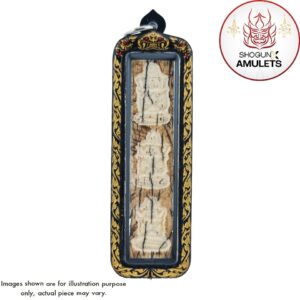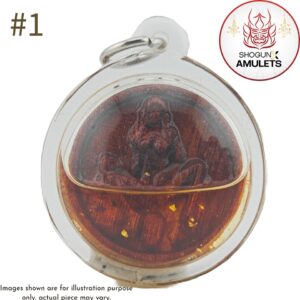Description
Aj Wanchai
BE 2568
Made 100
Size: 6 x 4 cm approx
𝗘𝗳𝗳𝗲𝗰𝘁𝘀 – –
Based on ancient & traditional beliefs, this is said to:
-Saneh (Charm & Attraction)
-Metta (Loving Kindness & compassion)
-Chok larp (Good luck & fortune)
-Ngern Thong (Wealth & riches)
𝗗𝗲𝘁𝗮𝗶𝗹𝗲𝗱 𝗱𝗲𝘀𝗰𝗿𝗶𝗽𝘁𝗶𝗼𝗻 – –
Mae Wanthong: Cursed Woman or Spirit of Barami?
In the eyes of Thai amulet collectors and those who believe in traditional magic, the story of Mae Wanthong is more than just a tragic love triangle—it’s a spiritual lesson in karma, loyalty, and the unseen power of feminine barami (merit and virtue).
Mae Wanthong was the wife of Khun Paen, a legendary warrior deeply skilled in mystical arts. Khun Paen wasn’t just a soldier—he was a master of Wicca, known for creating powerful amulets, invoking protective spirits, and father of Kumantong (Lukkok). As the wife of such a man, Mae Wanthong is seen by some, in some spiritual circles as the “Mother of magical powers”—not in technique, but in spiritual proximity to great power.
Her suffering and emotional conflict between Khun Paen and Khun Chang—two men representing magic and materialism—are seen as metaphors. In Thai occult belief, indecision is dangerous. Magic demands clarity, discipline, and unwavering intention. Mae Wanthong’s inability to choose was not just a personal flaw—it was, in a magical sense, a disruption of spiritual balance.
When she was executed for “being unfaithful” or “unable to choose,” some believe her spirit didn’t simply fade—it became a powerful presence. In certain folk traditions and modern mystical practices, statues, effigies, or amulets of Mae Wanthong are created—not as love charms, but as symbols of misunderstood virtue, female protection, and spiritual justice.
She is sometimes invoked by those who feel betrayed, judged unfairly, or trapped between conflicting duties—serving as a spiritual protector of the voiceless and wrongfully accused.









Reviews
There are no reviews yet.